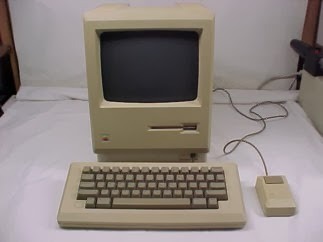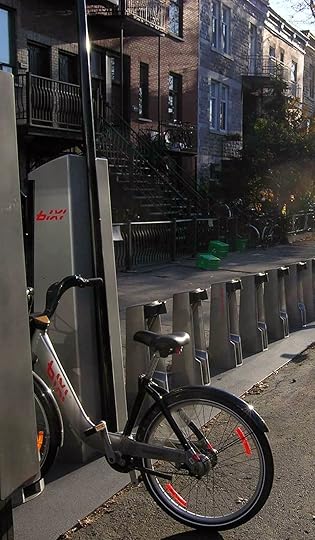Mary Soderstrom's Blog, page 67
February 3, 2014
Time Out, But Nto for Long, I hope
No excuses. but I've got an aching back, so I'm lying low.
Published on February 03, 2014 11:57
January 31, 2014
Getting Rid of Hydrocarbons: Good News from Denmark
Today's
La Presse
has an excellent and thought-provoking story about Denmark and its long term plans to quite using fossil fuels by 2050. And this in a country which has profited recently from oil production!
In brief, here's what the Danes are doing:
 In 2012, 95 per cent of the legislators from all parties voted to adopt policies which aim at having 100 per cent of all energy consumed coming from renewal sources. Currently 30 per cent of electricity comes from wind power, with a goal of 50 per cent by 2020. And it would seem that they're well on the way: in December 2013 60 per cent came from wind power with some days where 100 cent was.
In 2012, 95 per cent of the legislators from all parties voted to adopt policies which aim at having 100 per cent of all energy consumed coming from renewal sources. Currently 30 per cent of electricity comes from wind power, with a goal of 50 per cent by 2020. And it would seem that they're well on the way: in December 2013 60 per cent came from wind power with some days where 100 cent was.
They're opting for green energy as an economic motor: the wind sector has already created 30,000 jobs.
Most conventional electrical plants now have been converted from oil to coal, which will be gradually changed to biogas. Heat from these plants heat houses, while cold water from the sea provides air conditioning.
The big challenge is transport, but the Danes plan on using taxes breaks to favour electric and bio-gaz vehicules. The Metro in Copenhagen has been expanded, and 40 per cent of all travel to work and school is done by bike.
Food for thought, certainlly.
In brief, here's what the Danes are doing:
 In 2012, 95 per cent of the legislators from all parties voted to adopt policies which aim at having 100 per cent of all energy consumed coming from renewal sources. Currently 30 per cent of electricity comes from wind power, with a goal of 50 per cent by 2020. And it would seem that they're well on the way: in December 2013 60 per cent came from wind power with some days where 100 cent was.
In 2012, 95 per cent of the legislators from all parties voted to adopt policies which aim at having 100 per cent of all energy consumed coming from renewal sources. Currently 30 per cent of electricity comes from wind power, with a goal of 50 per cent by 2020. And it would seem that they're well on the way: in December 2013 60 per cent came from wind power with some days where 100 cent was.They're opting for green energy as an economic motor: the wind sector has already created 30,000 jobs.
Most conventional electrical plants now have been converted from oil to coal, which will be gradually changed to biogas. Heat from these plants heat houses, while cold water from the sea provides air conditioning.
The big challenge is transport, but the Danes plan on using taxes breaks to favour electric and bio-gaz vehicules. The Metro in Copenhagen has been expanded, and 40 per cent of all travel to work and school is done by bike.
Food for thought, certainlly.
Published on January 31, 2014 08:27
January 29, 2014
A Novel That Is As Counter-Cultural as Pete Seeger
Just this minute finished Michael Chabon's Telegraph Avenue--2:30 p.m., right in the middle of time I should be using for writing my own stuff, but I had to finish it.
This is probably the most engaging novel I've read in more than a year. A multi-layered story, it has a rather conventional plot: couple of dreamers find their unsuccessful record store about to be overwhelmed by competition while their wives face problems, plying their trade as midwives. Turns out one of the guys--the younger, African American one--has a 14 old son who shows up out of the blue. The other--Jewish, with severe psychological problems--also has a son, who falls in love with other boy. Along the way there are malpractice cases and "liberation" of a Zeppelin, as well as great riffs about music and life.

But it;s the journey that matters, and Chabon conveys us with splendor and
It happens that I know a lot of the territory covered, and I remember another legendary record store on Telegraph Avenue, this one just across from the UC Berkeley campus. That probably adds to the charm of the book for me, but I also was sometimes breathless at the images Chabon uses. One, both apt and hilarious, chosen at random, about suburbs beyond the Oakland hill: " "Sprinklers chittered. Titlesists traced white rainbows aginst the blue Contra Costa sky. Along the forearms of hard-shopping women in tennis skirts, sunshine lit the bolden down."
There are several loose ends, like the parrot named 58 who flies away after the death of his master. The reason for the name is never given, although it seems that 58 sounds like "sure to prosper" in one dialect of Chinese. On the other hand, in Feng Shui numerology 58 means "no money." Does this mean hat the world is impossibly difficult to understand and basically contradictory? Or are we just to take flight with the bird as it soars over 10 pages toward an improbable wild santuary?
Then there is the manner of a white guy assuming the voices of people of colour. I haven't yet gone looking to see what kind of reviews the book received from those who might be upset by Chabon's appropriation of voice. There are some, I imagine, who would be insulted by his audacity at trying to get inside the heads of his mixed-raee characters. The voices sound good to me, just as good as his description of child birth. The man is a good observer, for sure, and his soul is full empathy.
The photo, by the way, was taken almost 50 years ago during the Free Speech Movement: the crowd was marching off campus toward Telegraph Avenue. Long time ago.
Published on January 29, 2014 12:17
January 28, 2014
Pete Seeger: A Model for Us All (Turn,turn,turn)
Sometime when the Ingerman kids were young and the Soderstrom kids were only a hope, Doris and I took the gang down the Hudson to Albany (I think) to see Pete Seeger on The Clearwater, in the beginning of the campaign to clean up the Hudson.
Here's to him, all his good music and good causes. He leaves this world the better for his actions.
Here's to him, all his good music and good causes. He leaves this world the better for his actions.
Published on January 28, 2014 07:00
January 27, 2014
The Paranoia of the Plutocrats
The rich are different from you and me department: as usual Krugman nails it in today's
New York Times
. He comments about the out-of-the-ballpark criticism by the 1 per cent of attacks on what they have and receive:
"We are...talking about wheeler-dealers, men who push money around and get rich by skimming some off the top as it sloshes by. They may boast that they are job creators, the people who make the economy work, but are they really adding value? Many of us doubt it — and so, I suspect, do some of the wealthy themselves, a form of self-doubt that causes them to lash out even more furiously at their critics."
He adds:
"Anyway, we’ve been here before. It’s impossible to read screeds like (these) without thinking of F.D.R.’s famous 1936 Madison Square Garden speech, in which he spoke of the hatred he faced from the forces of “organized money,” and declared, “I welcome their hatred.”
"President Obama has not, unfortunately, done nearly as much as F.D.R. to earn the hatred of the undeserving rich. But he has done more than many progressives give him credit for — and like F.D.R., both he and progressives in general should welcome that hatred, because it’s a sign that they’re doing something right."
"We are...talking about wheeler-dealers, men who push money around and get rich by skimming some off the top as it sloshes by. They may boast that they are job creators, the people who make the economy work, but are they really adding value? Many of us doubt it — and so, I suspect, do some of the wealthy themselves, a form of self-doubt that causes them to lash out even more furiously at their critics."
He adds:
"Anyway, we’ve been here before. It’s impossible to read screeds like (these) without thinking of F.D.R.’s famous 1936 Madison Square Garden speech, in which he spoke of the hatred he faced from the forces of “organized money,” and declared, “I welcome their hatred.”
"President Obama has not, unfortunately, done nearly as much as F.D.R. to earn the hatred of the undeserving rich. But he has done more than many progressives give him credit for — and like F.D.R., both he and progressives in general should welcome that hatred, because it’s a sign that they’re doing something right."
Published on January 27, 2014 07:26
January 26, 2014
Saturday Photo: Skating Lessons
 The picture isn't of Jeanne and me, but we had a siimilar delightful session Saturday morning when she tried out skating for the first time.
The picture isn't of Jeanne and me, but we had a siimilar delightful session Saturday morning when she tried out skating for the first time.I'd come prepared with a Plan B in case she found the challenge of staying on her three-year-old feet just too much. But she loved it, particularly when she got the hang of using one of those supports that you can push ahead of yourself. We were out two hours that passed extremely quickly and she's ready to go try it again next weekend!
Now Grandma, who learned to skate after a fashion as an adult, will have to dig out her skates to keep up. (On the outdoor rink I thought it wiser to keep my boots on for stability's sake.)
Published on January 26, 2014 10:54
January 24, 2014
Mac Turns 30, Our First Mac Is 29
 In January 1985 we bought our first Mac, a 512. With all accessories, including printer, it cost well over $4,000, which was a lot of money.
In January 1985 we bought our first Mac, a 512. With all accessories, including printer, it cost well over $4,000, which was a lot of money.I've been thinking of that purchase today, which is touted as being Mac's 30th anniversary. I hadn't realized just what early adopters were in this case. But the time had come to get some kind of machine to do word processing and the Kaypro, which The Writers' Union of Canada was recommending for writers at the time, had one of those terrible yellow on green screens that I knew would give me migraines.
So, after much humming and hawing--and some arguing too about where we'd put it: Lee's office or mine--we went Macintosh. The compromise location was our bedroom, where it stayed until we got our second Mac two years later and we could each have one in our individual space.
We've stayed Mac ever since, largely because of its ease of use. We don't have any other Apple devices however--no iPhone or iPad, not even an iPod. Don't have a cell phone at all in fact, which says something about my attitude toward technology. If it can make your work simpler, go for it. If not, why waste money?
Published on January 24, 2014 17:21
January 23, 2014
The Days Grow Longer and (Maybe) Warmer
 As I write this at 4:30 p.m., the sun in now longer shining in the living room, but for the last several days, it has blazed away.
As I write this at 4:30 p.m., the sun in now longer shining in the living room, but for the last several days, it has blazed away.This is good winter weather in my book: it may be cold, but the sun is out and there is enough snow to make everything blaze with light.
And light is continuing longer and longer. A month ago it would have been dark at this hour, but the sky is still light since the sun won't disappear below the horizon for another 15 minutes.
Gonna be cold again tonight (it's currently -18 C or 0' F) but who cares, really, when you've got good heating and the prospect of spring in not too many months! We're lucky, I think....
Published on January 23, 2014 13:33
January 21, 2014
Something's Got to Give: Hydrocarbon Risks Abound, and Bixi on the Brink of Bankruptcy
If anybody thought there was a crisis underlying how we live now, the new these days should convince them.

In addition to increasing concern about the state of our highway infrastructure, pipelines and trains transporting petroleum products, the one truly innovative North American response to problems of transportation in cities, Montreal's Bixi, is asked for protection from bankruptcy.
The problems are real and complicated, and partly due to the fact that the bicycle rental system was set up as a private, supposedly profit-making firm, when it should have been integrated in the public transportation system from the beginning. And that is what should be done, a number of people are saying including Richard Bergeron, leader of the Projet Montreal opposition on Montreal's city council and François Cardinal, editorial writer for La Presse.
The basic problem is that we live too spread out and rely too much on cars to get around. It's about time that we understood that, and did something about it.
The economic repercussions of rebulding our transportation system and getting our aging infrastructure up to date would be enormous, and much more healthy that putting public money into petroleum exploration and tar sands exploitation.
.

In addition to increasing concern about the state of our highway infrastructure, pipelines and trains transporting petroleum products, the one truly innovative North American response to problems of transportation in cities, Montreal's Bixi, is asked for protection from bankruptcy.
The problems are real and complicated, and partly due to the fact that the bicycle rental system was set up as a private, supposedly profit-making firm, when it should have been integrated in the public transportation system from the beginning. And that is what should be done, a number of people are saying including Richard Bergeron, leader of the Projet Montreal opposition on Montreal's city council and François Cardinal, editorial writer for La Presse.
The basic problem is that we live too spread out and rely too much on cars to get around. It's about time that we understood that, and did something about it.
The economic repercussions of rebulding our transportation system and getting our aging infrastructure up to date would be enormous, and much more healthy that putting public money into petroleum exploration and tar sands exploitation.
.
Published on January 21, 2014 07:26
January 20, 2014
Cultural Misunderstanding: From "How are You?" to Body Language
What do you expect to hear when you say "How are you?" Most of the time in North Amreica's it's "Fine." But in Russia, apparently, what you'll get is a litany of what is wrong. Alina Simone reports on this cultural clash:
"It feels as if I’ve spent half my life trying to smooth over the bafflement of my American friends and the hurt feelings of my Russian expat family as a result of this innocuous inquiry. “ ‘Fine’ makes Russians think that Americans have no soul,” I explained recently to an American-born friend. “That they just want to go home, eat a frozen dinner in front of the TV, and wait out the hours before going to work to make money again.”
He laughed, then quickly sobered. “You know, there’s something to that.”
But there are other things that vary between cultures which can be either funny or disconcerting. Here's a great montageof three HSBC commercials that outline some of them. (This is not an endorsement of the bank, by the way, just in case your culture thinks that a mention is tantamount ot that.)
"It feels as if I’ve spent half my life trying to smooth over the bafflement of my American friends and the hurt feelings of my Russian expat family as a result of this innocuous inquiry. “ ‘Fine’ makes Russians think that Americans have no soul,” I explained recently to an American-born friend. “That they just want to go home, eat a frozen dinner in front of the TV, and wait out the hours before going to work to make money again.”
He laughed, then quickly sobered. “You know, there’s something to that.”
But there are other things that vary between cultures which can be either funny or disconcerting. Here's a great montageof three HSBC commercials that outline some of them. (This is not an endorsement of the bank, by the way, just in case your culture thinks that a mention is tantamount ot that.)
Published on January 20, 2014 10:32



